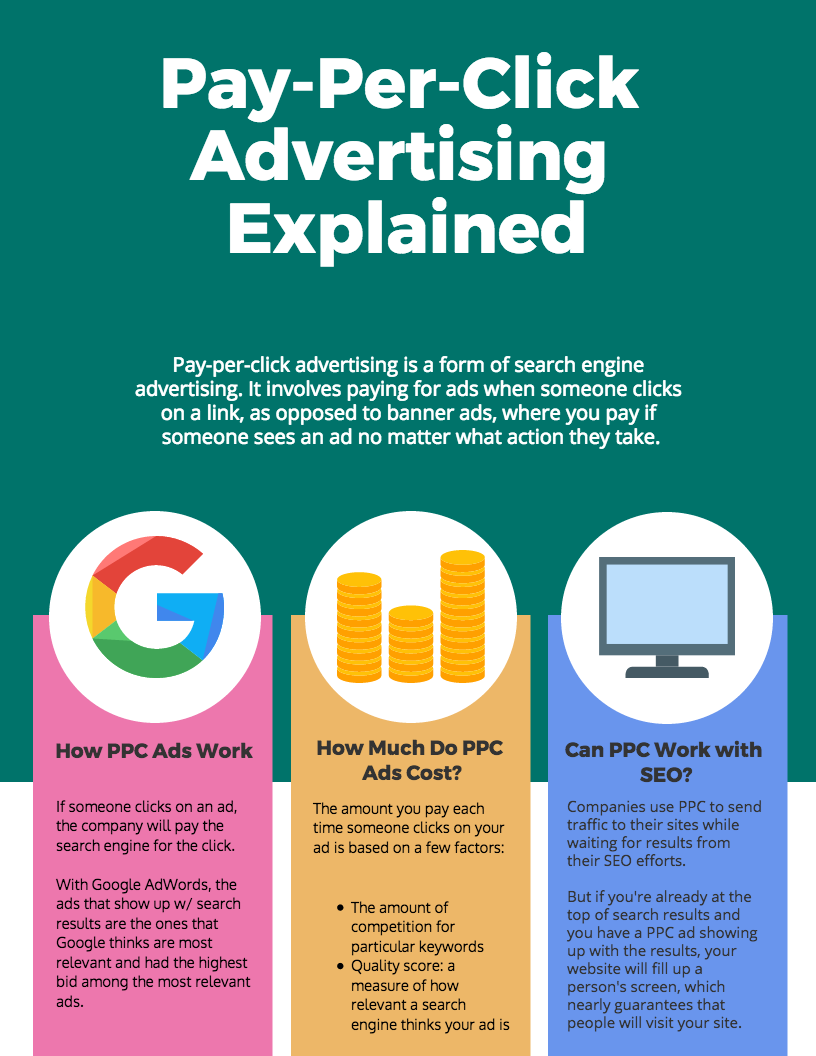PPC advertising works by placing ads on search engines or websites, and advertisers pay only when users click the ads. This method allows businesses to target specific audiences and track performance easily.
PPC, or Pay-Per-Click advertising, is a digital marketing strategy where advertisers bid on keywords relevant to their products or services. These ads appear at the top of search engine results or on various websites, capturing the audience’s attention. Businesses set a budget and only pay when someone clicks on their ad, making it cost-effective.
PPC advertising offers precise targeting options, ensuring ads reach the right audience. This method allows for real-time tracking and adjustments, helping businesses optimize their campaigns for better results. Effective PPC campaigns can drive traffic, increase conversions, and boost brand visibility.

Credit: www.freshbooks.com
Introduction To Ppc Advertising
PPC stands for Pay-Per-Click. It is a type of online advertising. Advertisers pay a fee each time someone clicks their ad. It helps drive traffic to websites. Ads appear on search engines and websites. The goal is to attract visitors quickly. PPC can be very effective. It targets people searching for specific terms.
PPC is a crucial tool in digital marketing. It offers immediate results and helps brands reach potential customers. PPC allows businesses to control their advertising budget. Companies can set a limit on how much to spend. This method is cost-effective and measurable. Advertisers can track the success of their campaigns. PPC helps in gaining a competitive edge.
Key Elements Of Ppc Campaigns
PPC advertising operates by allowing advertisers to bid on keywords relevant to their business. Ads appear on search engines, driving targeted traffic. Successful campaigns rely on keyword research, compelling ad copy, and effective landing pages.
Keywords: The Foundation
Keywords are the heart of PPC. Advertisers bid on keywords related to their business. Choosing the right keywords is crucial. Long-tail keywords often perform better. They are more specific and less competitive. Use keyword tools to find the best options. Focus on relevance and search volume. Monitor and adjust your keyword list regularly.
Ad Copy: Crafting Compelling Messages
Ad copy needs to grab attention quickly. Include strong calls to action. Highlight unique selling points. Use emotional triggers to connect with the audience. Keep the message clear and concise. Test different versions of your ad copy. Analyze performance to find the most effective messages. Consistency with the landing page is key.
Landing Pages: Converting Clicks Into Actions
Landing pages must be relevant to the ad. Ensure a clear and simple layout. The call to action should be prominent. Fast loading times are essential. Use visuals to engage visitors. Match the landing page content with ad promises. Test different designs and copy. Optimize for mobile devices.
Setting Up Your First Ppc Campaign
Google Ads and Facebook Ads are popular choices. Choose a platform where your audience spends time. Each platform has its own strengths. Facebook is great for targeting specific demographics. Google is effective for keywords and search intent.
Start with a small budget. Test and adjust as you go. Set a daily limit to control spending. Allocate more funds to high-performing ads. Use tools to track your return on investment (ROI).
Identify your ideal customer. Use age, location, and interests for targeting. Refine your audience with lookalike audiences. Exclude groups that are not relevant. Monitor and tweak your audience settings regularly.

Credit: senditrising.com
Optimizing Ppc Campaigns For Maximum Roi
Check data often. See which ads get the most clicks. Find which keywords work best. Look for trends. This helps improve your campaign. Make changes based on data. This can lead to more clicks and sales.
A/B testing compares two ads. See which one performs better. Try different headlines. Use different images. Change call-to-action buttons. Keep the winner. This makes your ads more effective.
Adjust bids to get better results. Bid higher for keywords that work well. Lower bids for keywords that do not. This saves money. It also boosts your ROI. Regularly update your bids. This helps stay competitive.
Advanced Ppc Strategies
Remarketing shows ads to people who visited your site. This helps bring them back. People are more likely to buy after seeing ads multiple times. You can create special ads for these visitors. Special offers can make them return and buy.
Geotargeting shows ads to people in specific areas. Ads can be tailored to local needs. You can focus on cities or regions where you have customers. This helps save money and improves ad performance. Local deals can attract more customers.
Ad extensions provide extra information in ads. They can show phone numbers, locations, or links to specific pages. This makes ads more useful and clickable. People find what they need faster with these extensions. They improve the chance of getting clicks.
Common Pitfalls In Ppc Advertising And How To Avoid Them
Many advertisers ignore the importance of search intent. This leads to irrelevant ads. Ads must match what users want. For example, users searching for “buy shoes” want to see shopping options, not blog posts.
Not using negative keywords wastes money. Ads will show for irrelevant searches. For instance, a bakery should exclude “bakery jobs”. This ensures ads reach only potential customers.
Without conversion tracking, it’s hard to measure success. Tracking helps identify which ads work best. This improves overall ad performance. Always set up conversion tracking for accurate data.

Credit: ppcexpo.com
Frequently Asked Questions
What Is The Process Of Ppc Advertising?
PPC advertising involves bidding on keywords, creating ads, and paying for clicks. Advertisers set budgets, target audiences, and monitor performance.
How Effective Is Ppc Advertising?
PPC advertising is highly effective for targeted traffic and leads. It offers measurable results and quick ROI.
What Is A Ppc Campaign And How Does It Work?
A PPC campaign is an online advertising strategy where advertisers pay each time a user clicks their ad. It works by bidding on keywords, creating ads, and targeting specific audiences. Ads appear on search engines and websites, driving traffic to the advertiser’s site.
Results are measurable and budget-controlled.
How Does Google Pay-per-click Work?
Google pay-per-click (PPC) works by advertisers bidding on keywords. Ads appear in search results. Advertisers pay when users click their ads. Higher bids and quality scores improve ad placement. PPC helps drive targeted traffic quickly.
What Is Ppc Advertising?
PPC advertising involves paying for each click on your ad. It’s a way to drive traffic to your website.
Conclusion
PPC advertising is a powerful tool for driving targeted traffic to your website. By understanding its mechanics, you can optimize campaigns for better results. Investing in PPC can significantly boost your online presence and sales. Start leveraging PPC today to achieve your business goals efficiently and effectively.
